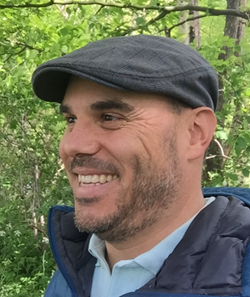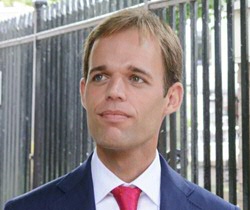Jacqueline Klooster, Luis Lobo-Guerrero and Arie van Steensel awarded NIAS Individual Fellowships
Three ICOG members – Jacqueline Klooster, Luis Lobo-Guerrero and Arie van Steensel – have been selected for individual fellowships at the Netherlands Institute for Advanced Study (NIAS) in Amsterdam. The NIAS Fellowships will allow the researchers to work on their projects for a period of 5 months in the academic year 2021/22. They will become part of a carefully selected community of independent thinkers, in a collaborative environment where the space is created to ask new questions beyond disciplinary boundaries. NIAS Fellows are selected through a highly competitive external review process on the basis of the quality of their research proposal.
Jacqueline Klooster: Leadership and literary art

In her NIAS project “Leadership and Literary Art: how the ancient world evaluated literature written by its political leaders,” Dr Jacqueline Klooster will investigate how the ancient Greeks and Romans evaluated leaders who were also literary artists, and how the evaluation of political leadership interacted with that of literary art. In our world the figure of the poet-dictator is familiar: Mao Zedong and Stalin wrote lyric poetry; Mussolini and Saddam Hussein novels. It is difficult to separate evaluation of these writings from that of the leadership and ideologies of their authors. The ancient world was familiar with a similar phenomenon. A number of prominent leaders both good and bad produced literary art. How did Greek and Romans evaluate these leaders and their literary activity? Or, how does the evaluation of political leadership interact with the evaluation of literary art? What can these evaluations teach us about changing leadership values? And what, in turn, do they reveal about the development of the (political, ideological, social) functions of literature? It is often hard to distinguish between aesthetic and ideological evaluations, then as now.
Luis Lobo-Guerrero: Sixteenth century Hispanic globality

In his NIAS-project “Sixteenth Century Hispanic Globality as a Connectivity Effect,” Prof. Luis Lobo-Guerrero will investigate how the Spanish imperial experience of the sixteenth century shaped a Western modern spatial imaginary. Between 1480, Bartolomeu Diaz’s trip to the Cape of Good Hope, and 1519-1521, Magellan-Elcano’s circumnavigation of the globe, an idea of globality began to colonize the imaginary of European universal order. By 1600, East India monopoly companies operated upon consolidated, if morphing, global spaces. Yet, little is understood about how these global spaces were constituted and the epistemological details of how they came about. This project explores such process from a connectivity perspective focusing on the Spanish imperial experience throughout the sixteenth century. It is part of Prof. Lobo-Guerrero’s wider intellectual endeavour to understand how we became globe-centred at the advent of modernity. The fellowship coincides with the launch of his most recent co-edited volume Mapping Connectivity and the Making of European Empire (Rowman & Littlefield, 2021), the second of a trilogy devoted to the analysis of the problem of thinking connectivity in relation to the making of global spaces.
Arie van Steensel: Corporations, citizens and the formation of urban communities

In his NIAS-project “Corporations, Citizens, and the Formation of Urban Communities in Europe, 1350-1550,” Dr Arie van Steensel will investigate to what extent and how occupational guilds, religious confraternities and neighbourhood associations contributed differentially to the formation of urban communities in late medieval Europe. This project examines the social fabric of late medieval cities, in order to assess the extent to which the activities of corporations were beneficial to both individual members and the wider community, and how their functioning can be explained. The resulting book will provide a comparative analysis of craft guilds, brotherhoods and neighbourhoods in Florence, London, Norwich, Ghent, and Leiden from 1350 to 1550. Apart from giving new historical insights into political participation and social solidarity in medieval urban society, the book also engages in broader debates about the role of bottom-up forms of association, social capital, and citizenship in the formation of communities.

About NIAS-KNAW
The Netherlands Institute for Advanced Study is an intellectual haven for international researchers, writers, journalists and artists to pursue their research or projects, to work in an interdisciplinary environment and to share their knowledge with society. In 2021, it celebrates its 50th anniversary.
It offers a diverse year-group of about 50 NIAS Fellows the opportunity to devote themselves to an independent research project. NIAS is the oldest Institute for Advanced Study in Europe whose founding mission is to foster curiosity-driven research. It is an institute of the Royal Netherlands Academy of Arts and Sciences (KNAW) and is located in Amsterdam.
| Last modified: | 25 May 2021 3.24 p.m. |
More news
-
10 June 2024
Swarming around a skyscraper
Every two weeks, UG Makers puts the spotlight on a researcher who has created something tangible, ranging from homemade measuring equipment for academic research to small or larger products that can change our daily lives. That is how UG...
-
21 May 2024
Results of 2024 University elections
The votes have been counted and the results of the University elections are in!
